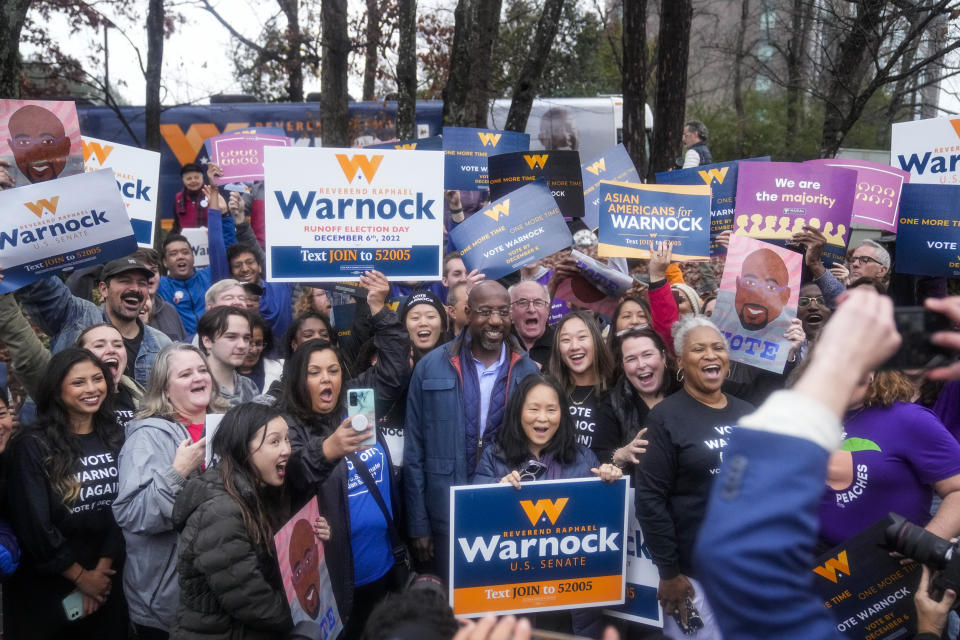Asian Americans heavily favored Warnock in Georgia runoff, exit poll shows
Asian American voters in Georgia showed strong Democratic leanings in the recent Senate runoff election, according to an exit poll.
An Election Day poll released by the Asian American Legal Defense and Education Fund on Wednesday showed that 78% of Asian American voters supported Democratic Sen. Raphael Warnock, who won, while about 22% favored Republican opponent Herschel Walker.
While the results reflect that the votes of Asian Americans, who are 4.7% of the state’s overall electorate, grew in support for Warnock since the midterm elections last month, Phi Nguyen, the executive director of Asian Americans Advancing Justice-Atlanta, said that whether or not the party can sustain the momentum and loyalty requires long-term engagement.
“There is a left tilt. At the same time … there’s a lot of opportunity left for parties to do that intentional outreach,” Nguyen said. “I think there is a risk of losing folks if they take voters for granted.”
For the exit poll, the organization surveyed 337 Asian American voters across DeKalb, Fulton and Gwinnett counties at five key high-Asian American precincts. The polling was conducted in four Asian languages — Bengali, Chinese, Korean and Vietnamese — as well as English.
It showed that support for Warnock in the runoff exceeded that in the general election last month, when 60% said they favored Warnock. The percentage who favored Walker, however, dipped from the 33% support in the midterms.

The survey, which also broke down voters by ethnicity, showed that Bangladeshi Americans had the highest support for Warnock, at over 96%, with Walker getting about 4%. Chinese Americans, who showed the lowest support for the senator, still overwhelmingly favored him, at 61.5%.
Nguyen emphasized that political opinions across the electorate are far from monolithic, pointing to the poll’s breakdown of Asian American voters by age. Those ages 18 to 29 voted for Warnock at 92% and Walker at about 7%.
The results were largely different among voters 70 and over, who favored Walker at 62.5%. A minority of that demographic supported Warnock at 37.5%.
“Younger AAPI are getting more and more progressive,” Nguyen said, using the initialism for Asian Americans and Pacific Islanders. “There’s just a widening gap there.”
Asian American voters prioritized a number of issues, ranking education, health care and economy/jobs as the top three categories influencing their votes. But when the results are broken down by candidate choice, those who supported Warnock ranked health care and education as their top two priorities, with the economy as the third. Those who voted for Walker ranked economy/jobs and education as top categories influencing their votes. Taxes ranked third place.
Karthick Ramakrishnan, the founder of the research and civic engagement organization AAPI Data, said that while there are important insights to be drawn from the poll, particularly because the Asian American Legal Defense and Education Fund is also involved in poll monitoring, there are a few limitations. Polling occurred in areas with higher densities of Asian American voters, which tend to skew Democratic. He also said there are likely to be differences between the demographic who voted on Election Day and those who voted early, depending on age, language access needs and party registration.
“At the same time, we should be careful to draw conclusions about the composition of the Asian American electorate or their voter preferences from surveys that are designed to ensure ballot access,” he said.
Ramakrishnan said that the uptick in support for Warnock since the midterms was significant and that communities will be better served, through more survey and interview data, if groups work to understand why — whether it’s because of the way the survey was conducted or because of changes in turnout and voter preferences.
Nguyen similarly noted that in the Atlanta area, voters heavily favored Warnock. And with much of the polling done in that region, results could have skewed further toward him compared to the rest of the state. In her interactions with voters on the ground, there were still many whom her organization considered “high potential” voters, or those who did not participate in the last few election cycles, and were still highly undecided.
“A lot of those voters that we were talking to are voters that are not prioritized by candidates or by parties and who have more of a risk of being left behind and not invested in,” Nguyen said. “I think that if you show up and you talk to those voters and you have things in-language, it shows a lot of investment and care that could go a long way.”
This article was originally published on NBCNews.com

